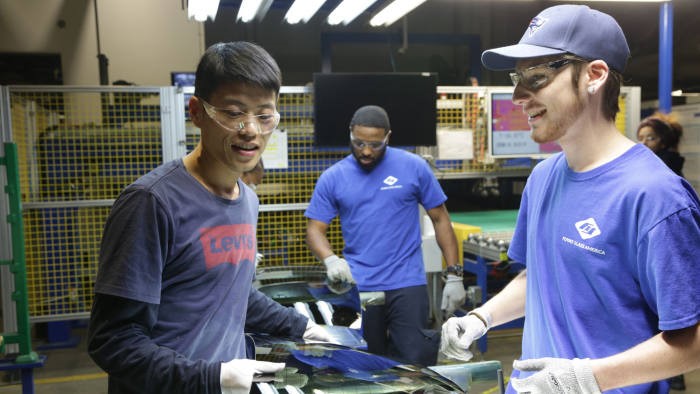By Simon Angelo
What do you do when you’re no longer President of the United States?
Make documentaries for Netflix, of course.
Barack and Michelle Obama’s production company, Higher Ground, has released their first documentary — American Factory.
I watched it the other night.
A Chinese billionaire opens a new Fuyao glass factory in the carcass of an old General Motors plant in Dayton, Ohio. Production begins and American jobs start, with high hopes. Then cultural clashes and a vastly different approach to labour relations threaten to derail the whole project.
The American management is soon fired, and the Chinese take control.

It’s both heartwarming and, at times, painful to watch.
While the documentary goes to some length to present both sides of the story, you can see that process is not effortless.
Ohio is a swing state.
And this documentary appears as an attack on Trump’s key policy of reinvigorating America’s industrial heartland.
It makes mockery of the tariff attack on China. Reminding viewers that the world has moved on. That even if manufacturing jobs come back, they will be very different.
Workers used to earn around $30 an hour. In the new Chinese-run factory, it’s about $12.
And the Fuyao factory has received many fines for health and safety violations, the most recent a $724,380 penalty for ‘exposing employees to multiple safety and health hazards.’
One former worker described the working culture as ‘Chinazi’. Another described it as without understanding for ‘what freedom really is and what it means’.
In my mind, the Obamas’ attack on the new deal to bring back American jobs is defeatist.
It assumes globalisation is a force, like the wind, that cannot be stood up to.
And it ignores the fact that the Chinese manufacturing miracle has brought with it large-scale industrial slavery.
The Global Slavery Index estimated that, on any given day in 2016, there were ‘over 3.8 million people living in conditions of modern slavery in China.’
In Brian Merchant’s book — The One Device: The Secret History of the iPhone —he goes behind the scenes to see what it’s like working at one of China’s vast assembly plants.
At the Foxconn plant in Longhua, Shenzhen, where iPhones get made, workers are housed up to 12 per room. Mistakes on the line are punished via public humiliation. Work hours are gruelling. 6 days a week. And salaries start at just 1,900 RMB per month (USD$298).
In 2010, workers at the Foxconn Longhua plant began killing themselves.
Foxconn CEO Terry Gou had large nets installed outside many of the buildings to catch falling bodies. And had workers sign pledges they would not attempt to take their own lives.
Foxconn is China’s largest private employer, with 1.3 million employees.
In fairness, China is ramping up labour laws to protect workers. In 2017, the government succeeded in identifying 10 cases of unpaid wages and took remedial action. But in a vast country like China, which lacks independent unions or collective bargaining, the laws are difficult for the most vulnerable workers to access.
Competing factories
It is simple economics that few developed countries can compete with Chinese manufacturing. Either by cost or scale.
The question, then, is should Chinese factories have open access to developed markets?
Given the huge trade surplus China has with America, China can’t win the trade war.
Tariffs will increase the price of Chinese goods and provide impetus for them to get made in America or elsewhere.
The trouble is that the goods won’t be produced as cheaply or efficiently. Chinese output will reduce, and that risks a slowdown impacting the entire global economy.
Yet, the wider concern is where we see history repeating. Similar dark clouds that have thundered down before are circling again.
A slowdown in demand for Japanese manufacturing in the 1930s led to chronic oversupply, deflation, debt defaults and outward aggression, culminating in the attack on Pearl Harbour in 1941. And the atomic bombings of Hiroshima and Nagasaki in 1945.
Today we see a resurgence of populist economics, mercantilism and another fast-growing power that has come out of isolation, vying for control on the world’s stage.
The tariffs make sense at some level to force a trade agreement focused on protecting IP and fairer terms.
But if Trump goes too far, he risks pushing a large bear into the corner. It’ll strike back at some point.
The net result of the trade war will most likely be some sort of compromise.
Downward pressure will remain on American wages. But China may need to reconsider its own industrial strategy and conditions.
As investors, American Factory is worth a watch to build understanding.
Towards the end, one of the most telling moments is when automated machines replace human labour. This renders China’s cheap army of nimble workers impotent. And America’s fat-fingered union members equally so.
Automation and technology will remain strong drivers in any manufacturing resurgence. While further changing the playing field.
We’re looking into some of these opportunities in our premium newsletter, Lifetime Wealth Investor.
The world is changing fast. It pays to stay informed.
Regards,
Simon Angelo
Editor, WealthMorning.com





Simon is the Chief Executive Officer and Publisher at Wealth Morning. He has been investing in the markets since he was 17. He recently spent a couple of years working in the hedge-fund industry in Europe. Before this, he owned an award-winning professional-services business and online-learning company in Auckland for 20 years. He has completed the Certificate in Discretionary Investment Management from the Personal Finance Society (UK), has written a bestselling book, and manages global share portfolios.